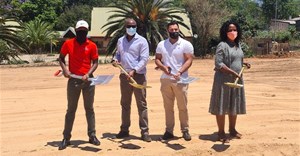Subscribe & Follow
Trending

 Woolworths sees over 20% drop in annual earningsAby Jose Koilparambil
Woolworths sees over 20% drop in annual earningsAby Jose Koilparambil



30 years of democracy: A call for a paradigm shift in rural infrastructure investment for prosperity

The key to unlocking their potential lies in strategic infrastructure investments. In this article, we delve into the transformative power of infrastructure development in rural communities, exploring both challenges and opportunities.
Rural communities are not merely geographical entities; they are reservoirs of untapped potential, brimming with talent, resources, and aspirations. However, their journey towards prosperity is often hindered by inadequate infrastructure, creating barriers to economic growth and social wellbeing. To aid their development, infrastructure is the bedrock upon which rural development stands.
At the heart of this philosophy lies the belief that infrastructure investments are not just concrete and steel structures; they are pathways to opportunity.
Take, for instance, the role of malls in rural areas. Contrary to conventional wisdom, these shopping centres are not mere commercial ventures; they are economic generators breathing life into communities. By providing employment opportunities and stimulating local commerce, malls become catalysts for sustainable development.
A well-placed mall not only creates jobs within its premises but also spawns ancillary businesses, from eateries to service providers, enriching the local economy. This interconnected ecosystem of commerce nurtures entrepreneurship and fosters a culture of self-reliance, empowering individuals to chart their own economic destinies.
Challenges to transformation leadership
Moreover, property development holds the key to addressing pressing social issues like unemployment and poverty. By investing in housing and commercial spaces, rural areas not only attract investment but also provide avenues for dignified livelihoods. As communities thrive, the cycle of poverty is disrupted, paving the way for sustainable growth and inclusive prosperity.
However, the path to rural development is not without its challenges. Limited access to financing, bureaucratic red tape, and inadequate infrastructure planning often act as stumbling blocks. Nonetheless, businesses, working with the government, should continue advocating for innovative solutions and partnerships to overcome these obstacles.
Transformative infrastructure projects can be spearheaded through partnerships, from road networks to utility expansions, laying the foundation for rural resurgence.
Embracing the rural imperative
As we look to the future, the imperative of rural development becomes ever more pressing. Climate change, urbanisation, and technological disruptions necessitate a paradigm shift in our approach towards rural areas. This makes investing in rural infrastructure not just a matter of economic prudence; but a moral imperative.
Granted, the journey towards unlocking rural potential is one fraught with challenges, yet brimming with opportunities.
By recognising property development as a tool for social transformation, we can pave the way for a future where no community is left behind. It is through such concerted efforts that we can truly build a world where prosperity knows no boundaries. This, as our nation reflects on our 30 years of democracy.



